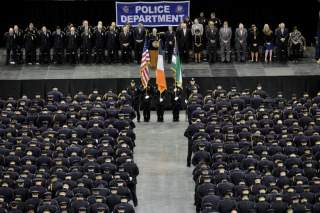Will Charlie Hebdo Change the NYPD?
The attack in Paris could force the NYPD to readopt controversial policies it previously discarded.
It was the deadliest attack in the French capital since the World War II era. Two brothers, Said and Cherif Kouachi, dressed as commandos with automatic weapons and black facemasks, barged into the offices of the French satirical magazine Charlie Hebdo, shot up the staff who were in the middle of an editorial meeting, and turned the office into a brutal crime scene. Across town, in a Kosher supermarket, a Frenchmen of African dissent named Amedy Coulibaly killed four people, held others as hostages, and threatened to kill each shopper in the market unless French police let the Kouachi brothers escape.
By the time the French police killed all three terrorists in near simultaneous raids, seventeen people were killed. France, the European country with the largest Islamic community at roughly 5 million Muslim, was a nation virtually at war, as French Prime Minister Manuel Valls would say days later.
The official claim by Al-Qaeda in the Arabian Peninsula that the Kouachi brothers were working for them, and that the Charlie Hebdo massacre was planned, orchestrated, and funded by the Al-Qaeda branch in Yemen, served as a confirmation that the terrorist network is far from defeated, as the Obama administration has consistently argued.
Equally disturbing to the death toll and brazenness of the raid, however, is the sheer simplicity of the Kouachi brother’s operation: two men, armed to the teeth, shooting up innocent people on a soft-target as innocuous as an office building, killing a dozen people inside. We have all heard about how dangerous and random “lone-wolf” attacks can be, but the terrorist attacks in France last week will add a new topic to the conversation: a small group of two to three people striking a soft target and doing damage before any police or law enforcement can respond.
The frightening aspect about the attack in Paris (in addition to the fact that a pillar of democracy—free speech—was deliberately attacked by Islamic extremists taking direction from an Al-Qaeda affiliate) is that it could theoretically happen anywhere. This is not fear mongering, but a reality: As NYPD Commissioner Bill Bratton acutely observed last week, there are simply too many potential soft targets to defend and not enough law enforcement and intelligence agents to defend them.
If Paris is a microcosm of France, New York City is a microcosm of the United States: a city where Americans of all colors, ethnicities, religions, and beliefs congregate, live, work, play and study. Along with London, New York is at the heart of world financial markets, the center of commerce, and truly one of the greatest cities in the world. Like it or not, all of these qualities are incentives for terrorists—whether lone wolves or terrorist organizations—to pinpoint New York as a prime target. NYPD Commissioner Bratton, Mayor Bill de Blasio, CIA Director John Brennan and President Barack Obama all know this is the case, and as the old adage says, it’s what keeps them up at night.
The New York Police Department may have gotten some bad press over the past month and a half over the death of Eric Gardner and its very public feud with Mayor de Blasio, but the department remains the best police force in the entire world. It’s intelligence and counterterrorism division led by Deputy Commissioner John Miller (who, if you recall, was live on-the-air with the late Peter Jennings during the September 11, 2001 attacks) consists of 1,000 dedicated officers whose sole job it is to “connect the dots,” thwart possible plots, and take would-be terrorists into custody. At the same time, the NYPD also has officers dispatched overseas, tasked with helping other police departments with terrorism-related investigations.
But, even with all of that talent and experience, the NYPD has a decision to make: after the attacks in Paris, can they do their jobs effectively without the kinds of controversial surveillance policies that got the department into trouble with civil liberties groups in the past? Before Commissioner Bratton and Mayor de Blasio entered office, the NYPD had a special unit assigned to map out Muslim communities across the entire New York metro area—a unit that, according to an extensive investigation by the Associated Press, included monitoring mosques, placing plain cloths agents into neighborhoods where Muslims lived and worked, and keeping a database of New York’s Muslim residents. The purpose was to determine which neighborhoods terrorist sleeper cells or lone wolfs would congregate and hide in before or after a terrorist attack in the city, and it was a divisive program that was shut down by Commissioner Bratton in early 2014 (the previous Commissioner, Raymond Kelly, heralded the program as critical to keeping New Yorkers safe).
It’s an awkward question, given the ethics and legal issues involved, but it’s worth asking: will the terrorist assault in France change the way the NYPD operates? Given the horrible massacre that took place in one of America’s oldest allies, will New York’s finest find the need to resurrect a program that could cause consternation with the city’s Muslims, even as it helps police assemble a stockpile of information that could be useful in the future? And finally, is the threat of lone wolf or small cell terrorism on soft targets heightened to such an extent that NYPD officers choose to devote more resources, manpower, money, and attention to intelligence work instead of ordinary crime?
All of these questions will have to be discussed among the NYPD’s top brass, if they aren’t already discussing it. Because if the Charlie Hebdo attack tells us anything, it’s that even people in an office can be prime targets for terrorists.
Image: Flickr/Diana Robinson

